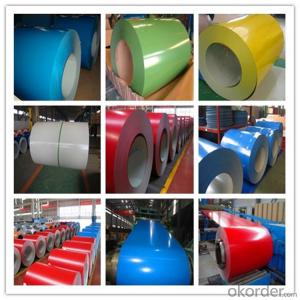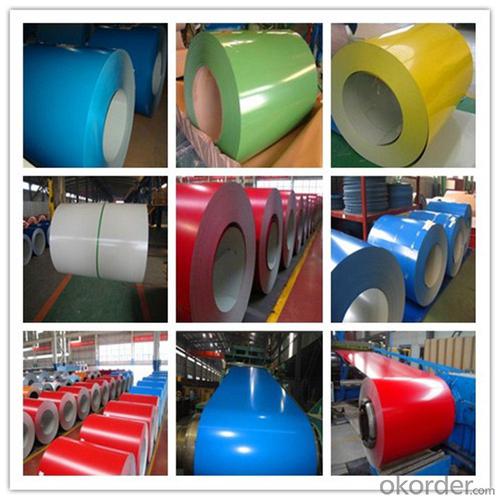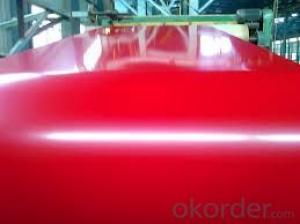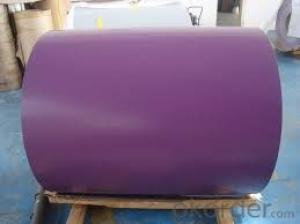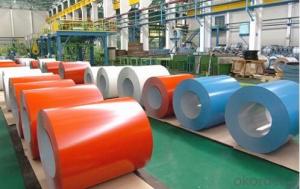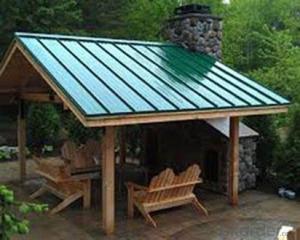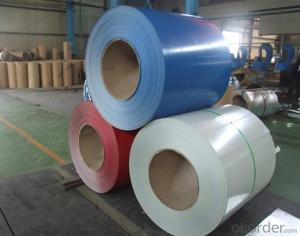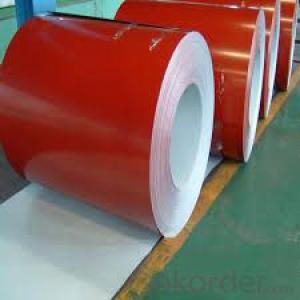Prepainted Galvanized Steel Coil Z275 PPGI Metal Roofing Sheets Building Materials
- Loading Port:
- Tianjin
- Payment Terms:
- TT OR LC
- Min Order Qty:
- 100 m.t.
- Supply Capability:
- 500000 m.t./month
OKorder Service Pledge
OKorder Financial Service
You Might Also Like
Specification
Prepainted Galvanized Steel Coil Z275 PPGI Metal Roofing Sheets Building Materials
Description of Prepainted Galvanized Steel Coil Z275
Product | PPGI/PPGL |
Capacity | 5,000 tons/month |
Base material | Hot dipped galvanized steel |
Thickness | 0.2-2.0mm |
Width | 600-1250mm(according to your need) |
Coil Weight | 3-6tons |
Quality | SGCC, DX51D |
Color | RAL No. or customers samples’ color |
Zinc-coating | 30g/m2-180g/m2 |
Coil ID | 508mm/610mm |
Technique | Cold rolled—hot dipped galvanized—color coated |
Painting | Top painting:15~25μm |
Back painting: 6~10μm | |
Tolerance | Thickness: +/-0.02mm |
Width:+/-2mm | |
Shipment time | within 15-45 workdays |
Payment | T/T, L/C at sight |
Packing | Standard export packing |
The special order can be negotiated. | |
Application of Prepainted Galvanized Steel Coil Z275
APPLICATION OF OUR PREPAINTED STEEL | ||||||||||
Construction | Outside | Workshop,agricultural warehouse,residential precast unit | ||||||||
corrugated roof,roller shutter door,rainwater drainage pipe,retailer booth | ||||||||||
Inside | Door,doorcase,light steel roof stucture,folding screen,elevator,stairway,ven gutter,Construction Wall | |||||||||
Electrical applicance | Refrigerator,washer,switch cabnet,instrument cabinet,air conditioning,micro-wave owen,bread maker | |||||||||
Fuiniture | Central heating slice,lampshade,chifforobe,desk,bed,locker,bookself | |||||||||
Carrying trade | Exterior decoration of auto and train,clapboard,container,isolation lairage,isolation board | |||||||||
Qthers | Writing panel,garbagecan,billboard,timekeeper,typewriter,instrument panel,weight sensor,photographic equipment | |||||||||
Products Show of Prepainted Galvanized Steel Coil Z275

Product Advantages
1.With nearly 20 years experience in prepainted steel, accommodate different marketdemands. | ||||||||||||||
2.'Quality first, service first' is our business aim; 'The good faith get respect,cast quality market' is our Business philosophy . | ||||||||||||||
3.Having two series producttion line,with the abbual production capacity of 240000 tons. | ||||||||||||||
4.Exceed International ISO9001:2008&ISO14001:2004 quality and environmental standards | ||||||||||||||
5.Meet with ROHS standard |
Company Information
CNBM International Corporation is the most important trading platform of CNBM group.
Whith its advantages, CNBM International are mainly concentrate on Cement, Glass, Iron and Steel, Ceramics industries and devotes herself for supplying high qulity series of refractories as well as technical consultancies and logistics solutions.


F A Q
1, Your advantages?
professional products inquiry, products knowledge train (for agents), smooth goods delivery, excellent customer solution proposale
2, Test & Certificate?
SGS test is available, customer inspection before shipping is welcome, third party inspection is no problem
3, Factory or Trading Company?
CNBM is a trading company but we have so many protocol factories and CNBM works as a trading department of these factories. Also CNBM is the holding company of many factories.
4, Payment Terms?
30% TT as deposit and 70% before delivery.
Irrevocable L/C at sight.
5, Trading Terms?
EXW, FOB, CIF, FFR, CNF
6, After-sale Service?
CNBM provides the services and support you need for every step of our cooperation. We're the business partner you can trust.
For any problem, please kindly contact us at any your convenient time.
We'll reply you in our first priority within 24 hours.
- Q: How does special steel perform in high-speed machining operations?
- Special steel is specifically designed to withstand high-speed machining operations with exceptional performance. Its unique composition and properties, including high hardness, heat resistance, and wear resistance, allow it to maintain its strength and durability even under extreme cutting speeds and temperatures. This enables special steel to deliver superior machining efficiency, precision, and surface finish, making it an ideal choice for high-speed machining operations.
- Q: What are the different methods of surface etching for special steel?
- There are several different methods of surface etching that can be used for special steel. These methods include: 1. Chemical etching: Chemical etching involves the use of various acids or other chemical solutions to selectively remove material from the surface of the steel. This method allows for precise control over the etching process and can create highly detailed patterns or designs on the steel surface. 2. Electrochemical etching: Electrochemical etching uses an electrical current to etch the surface of the steel. This method can be particularly effective for creating deep, uniform etches and is often used for marking or labeling purposes. 3. Laser etching: Laser etching involves the use of a high-powered laser to remove material from the steel surface. This method is highly precise and can create very intricate designs or markings. Laser etching is commonly used for branding or decorative purposes. 4. Mechanical etching: Mechanical etching utilizes physical abrasion to remove material from the steel surface. This can be done manually using tools such as sandpaper or brushes, or with the help of machinery like a sandblaster. Mechanical etching is often used to create a textured or roughened surface. 5. Plasma etching: Plasma etching involves the use of a high-energy plasma to remove material from the steel surface. This method is particularly useful for creating very fine, shallow etches and is commonly used in microfabrication or semiconductor manufacturing. Each of these methods has its own advantages and limitations, and the choice of which method to use will depend on factors such as the desired outcome, the type of special steel being etched, and the available equipment and resources.
- Q: How does special steel contribute to the power generation machinery industry?
- Special steel plays a crucial role in the power generation machinery industry as it provides the necessary strength, durability, and resistance to extreme temperatures and corrosion. The use of special steel in components such as turbine blades, generator shafts, and boiler tubes enhances the overall efficiency and reliability of power generation machinery. Additionally, special steel's unique properties enable the production of more compact and lightweight equipment, leading to improved performance and reduced energy consumption.
- Q: What are the specific requirements for special steel used in the textile machinery industry?
- The special steel requirements for the textile machinery industry can differ based on the specific application and machinery involved. Nevertheless, there are several common requirements in this industry. Firstly, corrosion resistance is crucial as textile machinery is frequently exposed to moisture, chemicals, and other corrosive substances. Therefore, the special steel used must possess excellent corrosion resistance properties to ensure durability and longevity. Secondly, high strength is necessary since textile machinery operates under high loads and stresses. Consequently, the special steel employed must have strong characteristics to withstand these forces and prevent deformation or failure. Furthermore, wear resistance is important as textile machinery involves constant contact between different components, leading to wear and tear. Thus, the special steel utilized should exhibit good wear resistance properties to minimize friction and extend the machinery's lifespan. Additionally, heat resistance is vital as textile machinery often operates at high temperatures due to friction generated during the manufacturing process. Consequently, the special steel used should possess exceptional heat resistance to prevent deformation or loss of mechanical properties under high temperature conditions. Moreover, machinability is necessary for the special steel used in the textile machinery industry. This allows for the production of complex components with precise dimensions, ensuring smooth and efficient machinery operation. Lastly, cost-effectiveness is crucial while meeting all the aforementioned requirements. Manufacturers strive to balance performance and cost to maintain competitiveness in the market without compromising on quality. It is important to note that these requirements can vary depending on the specific application within the textile machinery industry. As a result, manufacturers and engineers must carefully evaluate their machinery's requirements and choose the appropriate special steel accordingly.
- Q: What is the role of boron in special steel alloys?
- Boron plays a crucial role in special steel alloys, particularly in enhancing their mechanical properties and overall performance. One of the primary functions of boron is as a hardenability agent, meaning it improves the hardness and strength of the steel. This is achieved through the formation of boride particles, which act as strengthening agents within the microstructure. Additionally, boron aids in the refinement of the grain structure of steel, resulting in improved toughness and resistance to cracking. It promotes the formation of fine-grained microstructures, which in turn increase the steel's ability to withstand high temperatures, pressure, and wear. Moreover, boron assists in the solidification process of steel, reducing the risk of hot cracking during casting or welding. It lowers the melting point of steel, allowing for better fluidity and improved flowability during manufacturing processes. Furthermore, boron can also enhance the machinability of steel alloys, making them easier to work with and reducing tool wear. Overall, the addition of boron to special steel alloys significantly contributes to their strength, hardness, toughness, and resistance to various forms of degradation. Its role is vital in optimizing the performance and durability of these alloys in demanding applications such as automotive components, aerospace structures, and industrial machinery.
- Q: How does special steel perform in surface hardening applications?
- Special steel is known for its excellent performance in surface hardening applications. Surface hardening is a process used to increase the hardness and wear resistance of the outer layer of a metal component, while maintaining a tough and ductile core. Special steel, also known as alloy steel, is specifically designed to possess certain desirable properties, such as high strength, toughness, and resistance to corrosion and heat. When it comes to surface hardening, special steel exhibits superior characteristics compared to regular steel. Its alloying elements, such as chromium, molybdenum, and vanadium, enhance its hardenability, allowing for effective heat treatment processes like carburizing, nitriding, or induction hardening. These processes modify the surface microstructure of the steel, resulting in increased hardness and wear resistance. Special steel's ability to be hardened to a greater depth than regular steel makes it ideal for surface hardening applications. The hardened layer formed on the surface provides protection against abrasion, erosion, and fatigue, thus significantly extending the lifespan of the component. Additionally, the improved wear resistance and hardness of special steel make it suitable for applications in industries such as automotive, aerospace, and manufacturing, where components are subjected to extreme conditions and high levels of stress. Furthermore, special steel's exceptional mechanical properties make it highly durable even after surface hardening. It retains its toughness and strength, ensuring that the component can withstand heavy loads and impacts without failure. This combination of hardness and toughness is crucial for applications where both wear resistance and structural integrity are essential. In conclusion, special steel is highly effective in surface hardening applications due to its superior hardenability, wear resistance, and mechanical properties. Its ability to withstand extreme conditions and maintain its durability makes it a preferred choice for industries that require components with enhanced surface hardness and longevity.
- Q: What are the different marine grades of special steel?
- There are several marine grades of special steel commonly used in marine applications. Some of the most widely known grades include 316, 316L, and 2205. These grades are specifically designed to resist corrosion and maintain their strength and integrity in harsh marine environments. Additionally, other grades such as 304 and 904L are also used in marine applications for their corrosion resistance properties.
- Q: What are the main advantages of using special steel in the power generation industry?
- The main advantages of using special steel in the power generation industry are its exceptional strength, resistance to corrosion and high-temperature capabilities. These properties make special steel highly suitable for critical components like turbines, boilers, and generators, ensuring their durability and reliability in harsh operating conditions. Additionally, special steel's ability to withstand extreme pressure and stress enhances the overall safety and efficiency of power plants.
- Q: How does special steel contribute to improving product safety?
- Special steel contributes to improving product safety in several ways. Firstly, special steel is known for its exceptional strength and durability, making it highly resistant to corrosion, wear, and impact. This robustness ensures that products made with special steel can withstand various external forces and environmental conditions, reducing the likelihood of structural failures or accidents. Additionally, certain types of special steel possess unique properties, such as heat resistance or high conductivity, which are crucial for applications in industries like aerospace and automotive, where safety is of utmost importance. Moreover, special steel undergoes rigorous testing and quality control processes to ensure its compliance with safety standards and regulations, guaranteeing the reliability and consistency of the final products. Overall, the utilization of special steel in manufacturing enhances product safety by providing superior strength, resilience, and adherence to safety guidelines.
- Q: How is special steel used in the production of cutting inserts?
- Special steel is used in the production of cutting inserts due to its unique properties that make it ideal for this application. Cutting inserts are used in machining operations to remove material from a workpiece and shape it into the desired form. These inserts need to be able to withstand high temperatures, resist wear and abrasion, and maintain their sharp cutting edges for prolonged periods. Special steel, also known as tool steel, is specifically designed to meet these requirements. It is an alloy that contains various elements such as chromium, tungsten, vanadium, and molybdenum, which enhance its mechanical properties. Special steel has excellent hardness, toughness, and high-temperature resistance, making it suitable for cutting inserts. The special steel used in the production of cutting inserts undergoes a series of processes, including heat treatment, to further enhance its properties. Heat treatment involves heating the steel to a specific temperature and then rapidly cooling it, which adds strength and hardness to the material. This process helps to ensure that the cutting inserts can withstand the extreme forces and temperatures encountered during machining operations. Additionally, special steel can be coated with various materials, such as titanium nitride or diamond-like carbon, to further improve its performance. These coatings enhance the hardness, reduce friction, and improve the overall wear resistance of the cutting inserts, increasing their lifespan and efficiency. In summary, special steel is used in the production of cutting inserts due to its exceptional hardness, toughness, high-temperature resistance, and wear resistance. These properties allow the cutting inserts to withstand the demanding conditions of machining operations and maintain their sharp cutting edges for prolonged periods, resulting in efficient and precise material removal.
Send your message to us
Prepainted Galvanized Steel Coil Z275 PPGI Metal Roofing Sheets Building Materials
- Loading Port:
- Tianjin
- Payment Terms:
- TT OR LC
- Min Order Qty:
- 100 m.t.
- Supply Capability:
- 500000 m.t./month
OKorder Service Pledge
OKorder Financial Service
Similar products
Hot products
Hot Searches
Related keywords
